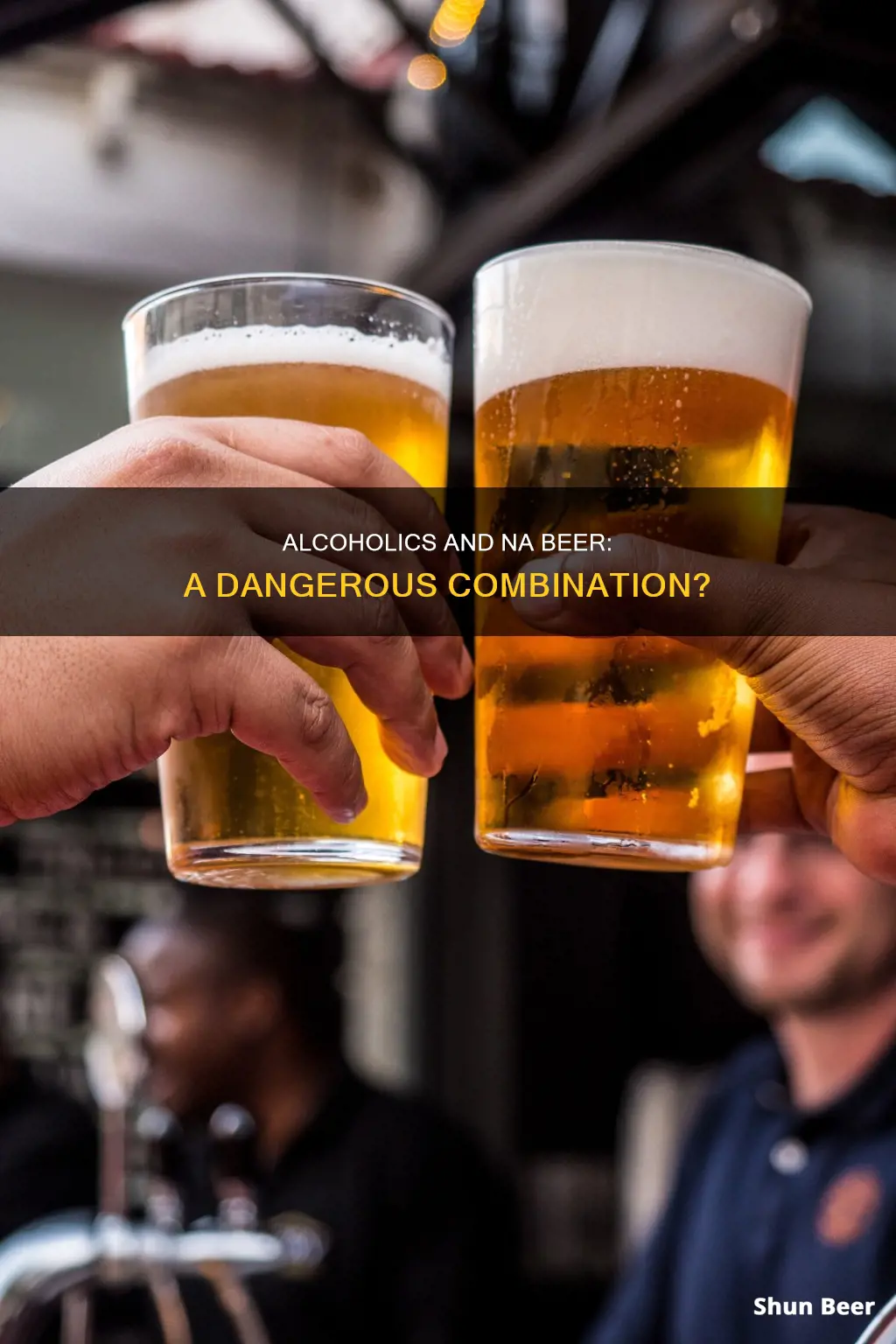
Non-alcoholic beer is a growing trend, with many people turning to it as they edge towards sobriety or try to reduce their alcohol intake. However, the question of whether an alcoholic should drink NA beer is complex and depends on various factors. While some argue that NA beer provides a valuable alternative for those looking to moderate their alcohol consumption, others warn of the dangers it may pose for recovering alcoholics.
NA beer often contains up to 0.5% alcohol by volume, and some studies have found that it may contain more alcohol than indicated on the label. For individuals in recovery from alcoholism, even small amounts of alcohol can be risky, and the smell, taste, and rituals associated with NA beer can trigger cravings and lead to a relapse. However, others argue that NA beer helps them blend in at social events and provides a path to ultimate sobriety by allowing them to gradually reduce their alcohol consumption.
Ultimately, the decision to drink NA beer during recovery depends on the individual's unique situation and their ability to evaluate the benefits and risks it brings. While it may work for some, others may find it triggering and detrimental to their sobriety.
| Characteristics | Values |
|---|---|
| Alcohol Content | Non-alcoholic beer is defined as containing 0.5% or less of alcohol by volume (ABV). However, non-alcoholic beers often contain more alcohol than their labels claim. |
| Pros | Non-alcoholic beer is a valuable alternative for people looking to moderate their alcohol intake. It can help recovering alcoholics feel included in social situations. It also has health and relaxation benefits. |
| Cons | Non-alcoholic beer can trigger a relapse in recovering alcoholics. It can also lead to a "placebo effect" of intoxication, causing a craving for more. |
What You'll Learn
- NA beer may be triggering for people in recovery
- NA beer can be a valuable alternative for people looking to moderate their alcohol intake
- NA beer can be a gateway to falling off the wagon
- NA beer can help recovering alcoholics feel included in social situations
- NA beer can be a slippery slope for recovered addicts

NA beer may be triggering for people in recovery
NA beer has been hailed as a safe alternative to alcoholic beer, but it may be triggering for people in recovery from alcohol use disorder.
NA beer is often marketed as a "car driver's beer" or a "responsible alternative" to regular beer. It is also increasingly being marketed as a sports drink, with some brands calling it an "isotonic thirst quencher for athletes". The beverage has gained popularity among athletes in Germany, who use it as an effective recovery drink.
However, for people in recovery from alcohol use disorder, NA beer may pose risks due to its association with alcoholic beer. The smell and taste of NA beer can trigger cravings and relapse, as it closely resembles regular beer. The process of removing alcohol from regular beer does not eliminate all traces of alcohol, and some NA beers may contain up to 0.5% alcohol by volume (ABV). This can be particularly dangerous for pregnant individuals, as any amount of alcohol consumption during pregnancy can lead to fetal alcohol spectrum disorder (FASD) and other birth defects.
Additionally, maintaining old drinking habits and social connections can hinder recovery. Sitting around drinking NA beer with the same people in the same places as before can reinforce old drinking behaviours. Recovery experts recommend developing a drug-free lifestyle, making healthy lifestyle changes, and finding new social connections to support long-term sobriety.
While NA beer may be a safe option for some, it is crucial for those in recovery to assess their individual triggers and make informed decisions. Alternatives to NA beer, such as soda with fresh lime juice or fruit, can be considered to reduce the risk of relapse. Ultimately, the decision to consume NA beer during recovery depends on personal comfort and susceptibility to triggers.
A Beer Odyssey: 100 Brews in a Day
You may want to see also

NA beer can be a valuable alternative for people looking to moderate their alcohol intake
NA beer, or non-alcoholic beer, is a beverage that contains very little to no alcohol. In the United States, for a drink to be considered non-alcoholic, it must contain 0.5% or less alcohol by volume (ABV). This means that NA beers have around 1/10th of the alcohol content of regular beers.
NA beer has gained popularity in recent years as more people move towards sobriety or become "sober-curious". It provides a valuable alternative for those who want to reduce their alcohol intake without giving it up entirely. For those who enjoy the sensation and experience of drinking alcohol, NA beer offers a way to occasionally enjoy a drink while still maintaining sobriety as an attainable goal.
One of the benefits of NA beer is that it allows people to blend in during social situations where drinking is involved. It can help reduce the feeling of isolation that comes with not being able to have a drink with friends or colleagues. NA beer gives recovering alcoholics the ability to feel included without compromising their sobriety.
NA beer also has health benefits compared to regular beer. It is typically made with only four natural ingredients - water, yeast, malt, and hops - and contains fewer preservatives and added sugars. It is a more organic and wholesome option than full-alcohol lager.
Additionally, NA beer can be a helpful tool for those contemplating sobriety. The idea of never drinking alcohol again can be overwhelming for some people, and NA beer provides a way to gradually reduce their alcohol intake. It creates a space for people to address their addiction and make positive changes without feeling like they are giving up alcohol completely.
However, it is important to note that NA beer may not be suitable for everyone. For individuals recovering from alcoholism, the smell, taste, and ritual associated with beer can be triggering and lead to a relapse. The decision to drink NA beer should be made with caution and consideration of one's own situation and commitment to sobriety.
Overall, NA beer can be a valuable alternative for people looking to moderate their alcohol intake. It provides an option for those who want to reduce their alcohol consumption while still enjoying the social and sensory aspects of drinking beer.
Beer and Blood Tests: Safe or Not?
You may want to see also

NA beer can be a gateway to falling off the wagon
Non-alcoholic (NA) beer is often presented as a safe alternative to regular beer, but it can pose risks, especially for those with alcohol use problems. While NA beer may be a good option for some, it is important to be aware of its potential dangers.
The Risks of NA Beer
NA beer often smells and tastes similar to regular beer, and this can be triggering for people in recovery from alcohol use disorder. The smell and taste of beer may evoke cravings and lead to a relapse. Research supports this, showing that the smell of beer may be enough to trigger cravings and a subsequent relapse among certain people with alcohol use disorder.
In addition, NA beers may still contain small amounts of alcohol. In the United States, products labelled as "non-alcoholic" can contain up to 0.5% alcohol by volume (ABV). While this amount is unlikely to get someone intoxicated, it can still be risky for people in recovery from alcoholism. Even a small amount of alcohol can be a gateway to falling off the wagon for those who have sworn off alcohol completely.
The Appeal of NA Beer
NA beer has become increasingly popular, particularly among millennials who are rejecting the alcohol-centric culture of previous generations. Many people are seeking alcohol alternatives for health reasons, and NA beer provides a way to enjoy the taste and sensation of beer without the intoxicating effects of alcohol.
NA beer can also be a good option for those who want to cut back on their alcohol intake without giving it up completely. It allows people to enjoy the social aspects of drinking without the negative consequences of alcohol.
Making an Informed Choice
Ultimately, the decision to drink NA beer is a personal one. For some, it may be a helpful tool in their journey towards sobriety, while for others, it may pose too great a risk. It is important to be aware of the potential dangers and make an informed choice.
If you are in recovery from alcohol use disorder, it is crucial to consider your own triggers and make choices that support your ongoing sobriety. This may include avoiding NA beer and other alcohol-free beverages that mimic the taste and smell of alcohol.
Final Thoughts
While NA beer can be a helpful option for some, it is important to recognize that it may also be a gateway to falling off the wagon for those with a history of alcohol use problems. The risks of NA beer include triggering cravings and the potential presence of small amounts of alcohol. Therefore, it is crucial for individuals to make an informed decision about whether NA beer is a safe choice for them.
Beer and Metronidazole: Is It Safe to Mix?
You may want to see also

NA beer can help recovering alcoholics feel included in social situations
The Challenges of Socialising for Recovering Alcoholics
Recovering alcoholics often feel isolated and excluded when socialising with peers. Not being able to have a drink with dinner or at a ball game can make recovering alcoholics feel awkward and separate from their friends. This can be challenging for people who are trying to quit drinking.
How NA Beer Can Help
NA beer gives recovering alcoholics the ability to blend in and feel included in social situations where drinking is inevitable, without compromising their sobriety. It allows them to enjoy the taste and sensation of beer, without the intoxicating effects of alcohol.
The Benefits of NA Beer
NA beer has several benefits for recovering alcoholics. Firstly, it can help them transition to a life of sobriety by allowing them to gradually reduce their alcohol intake. Secondly, it can help them feel included in social situations and maintain their social connections, which is an important part of recovery. Finally, NA beer is often made with more natural ingredients and fewer preservatives and added sugars than regular beer, making it a healthier alternative.
The Risks of NA Beer
However, it is important to note that NA beer does come with certain risks for recovering alcoholics. The smell, taste, and sensation of NA beer can trigger cravings and lead to a relapse. The sound of opening a can, the malty aroma, or the feel of a cold, beaded glass can stimulate the reward centres of the brain and release dopamine. Additionally, the label "non-alcoholic" can be misleading as these beverages often contain up to 0.5% alcohol by volume. For some recovering alcoholics, it is best to avoid anything that smells or tastes like alcohol.
Liver Transplant and Alcohol: Is Drinking Beer Safe?
You may want to see also

NA beer can be a slippery slope for recovered addicts
Non-alcoholic (NA) beer has become increasingly popular in recent years, with rising numbers of people embracing sobriety or becoming "sober-curious". While NA beer can be a good option for people looking to reduce their alcohol intake, it may pose risks for those in recovery from alcohol addiction.
The Risks of NA Beer for Recovered Alcoholics
The biggest concern with NA beer for recovered alcoholics is the potential for relapse. Even though these beverages have little to no alcohol content, they mimic the look, taste, and sensation of regular beer very closely. This can be triggering for people in recovery, stimulating cravings and potentially leading to a devastating relapse. The sound of cracking open a can, the smell, and the feel of a cold beer in one's hand can activate the reward centres in the brain and release dopamine, making it difficult for someone in recovery to maintain their sobriety.
The idea of "euphoric recall" is also important to consider. Drinking an NA beer may trigger selective memories of past drinking experiences, causing the individual to romanticise their previous drinking habits and forget the negative consequences. This can weaken their commitment to sobriety and lead them to believe they can now drink in moderation.
Furthermore, the very name "non-alcoholic beer" is misleading. By law, NA beers can contain up to 0.5% alcohol, and some studies have found that many of these beverages contain more alcohol than their labels indicate. For someone in recovery, even small amounts of alcohol can be detrimental, and the risk of drinking any alcohol at all may be too great to justify consuming NA beer.
The Benefits of NA Beer for Social Situations
One of the biggest challenges for people in recovery is feeling isolated in social situations where alcohol is present. NA beer can help individuals feel included and less awkward when everyone else is drinking. It allows them to blend in and still enjoy a beer-like experience without compromising their sobriety.
Additionally, NA beer provides an option for those who want to reduce their alcohol intake but are not ready to commit to total abstinence. It serves as a valuable alternative for those who enjoy the experience of drinking but do not want the negative effects of alcohol.
Final Thoughts
Whether NA beer is a slippery slope or a helpful tool depends on the individual. Each person must evaluate their own situation and determine if the benefits of NA beer outweigh the risks. For some, the risks may be too great, and complete abstinence from any alcohol-like beverages may be necessary. For others, NA beer may provide a way to ease the transition to a sober lifestyle and help them feel more comfortable in social situations. Ultimately, the decision to drink NA beer during recovery is a personal one, and there is no one-size-fits-all answer.
Beer and Bees: An Unlikely Friendship?
You may want to see also
Frequently asked questions
NA beer, or non-alcoholic beer, is a type of beer that contains very little to no alcohol. By law, NA beers sold in the United States can contain up to 0.5% alcohol by volume (ABV), but many brands claim to offer 0.0% ABV.
The general consensus is that drinking non-alcoholic beer during recovery can pose a considerable risk for alcoholics. However, there is no black-or-white answer, and each person must evaluate their situation to determine if the benefits of drinking NA beer outweigh the risks.
For many recovering alcoholics, the smell, taste, and sensation of NA beer can trigger a relapse. Additionally, NA beer often contains more alcohol than its label claims, and drinking it can lead to positive alcohol tests in some individuals.







